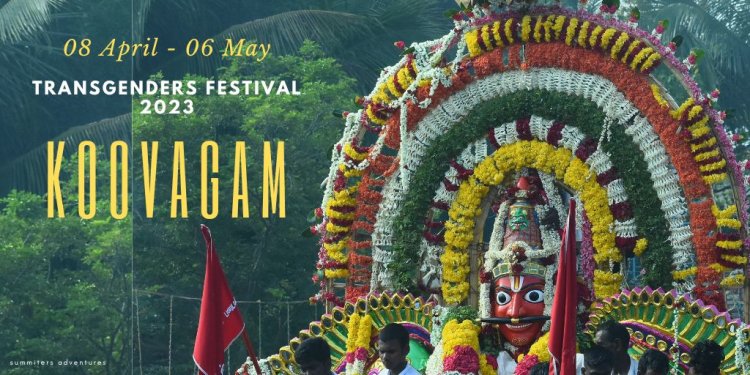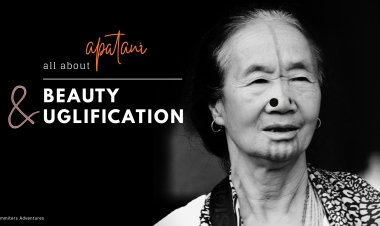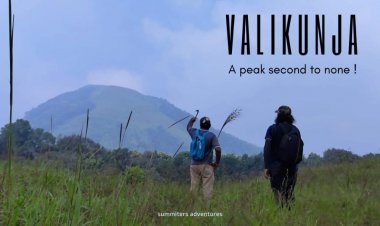Koovagam - A Festival of Drag Queens !
Every year at the end of every spring a sleepy hamlet in tamil naducalled Koovagam wakes up to wprlds attention with a unique festivalat its only temple dedicated to lord Kootthandavar.The Villagers host special guests.the eunuchs of India. A 18 day festival includes tying nupital knots The wedding of drag queen, fashion shows, Chariot festival and fare, with host of events. Finally ends on last day with the eventual widow hood symbolised in breaking the nuptial knot and bangles and the subsequent grief – That’s Festival of Trans Genders !
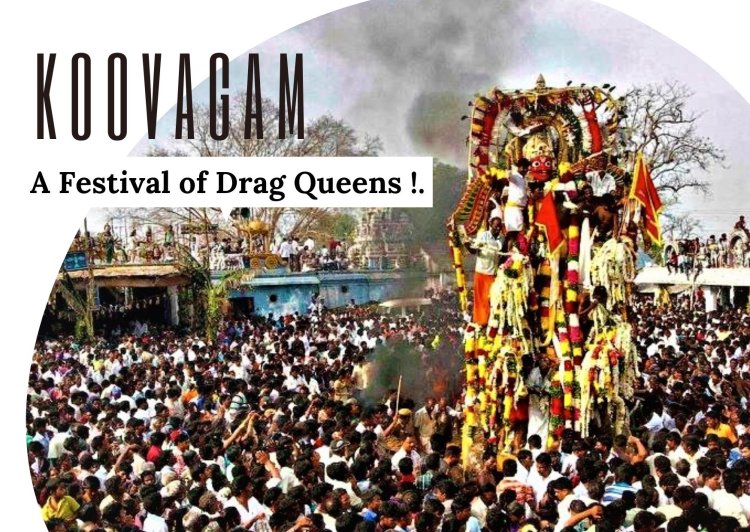
Bharata - A land of rich cultural diversity and heritage is popularly referred to as India today. Every religion of the world has its roots here and all living in harmony since time immemorial. With over 66 popular festivals, celebrated here and is known for its religious importance
Every year, along with the major festivals, we also get to witness a significant number of unique, unusual celebrations with rituals that are celebrated in every nook and corner of the country. From Fagli Festival in Himachal to Faecal Festival in Karnataka. Be it the Wangala festival in Meghalaya or to Pushkar Festival in Rajasthan. Festivals are celebrated with much pomp and importance.
But out of all these festivals, one particular festival stands apart and makes a difference
Festival of Drag Queen
This fascinating history is celebrated as a festival in the small village of Tamil Nadu known as Koovagam. every year in the month of Chaitra (April/May).
The whole village goes alive and buzzing with activity and welcomes all genders for the upcoming 18-day extravaganza. What makes it unique is that the festival is one of the largest gatherings of the transgender community from across the country.
The event has become so popular that, it has crossed the borders, and every year the transgender throng here along with LGBT across the country.
The festival is unique altogether and is celebrate the sacrifice a character in the great epic of Mahabharata. However not many know about this true Hero, who sacrificed his life on the 8th day of the Kurukshetra war.
Various mythological stories trace back to the importance of Lord Aravan in this specific community.
As one version of the epic says that Aravan, one of the sons of Arjuna fights with Alambusa the Kaurava warrior, and dies as a true hero.
The other version says that he offers himself as a sacrifice to Goddess Kali for the victory and greater good of the Pandavas.
Aravan is regarded as the chief deity of the Koothandavar cult and is worshipped by the transgender people of the region. Hence they are also known as aravanis or as thirunangai (for transgender women) and thirunambi (for transgender men).
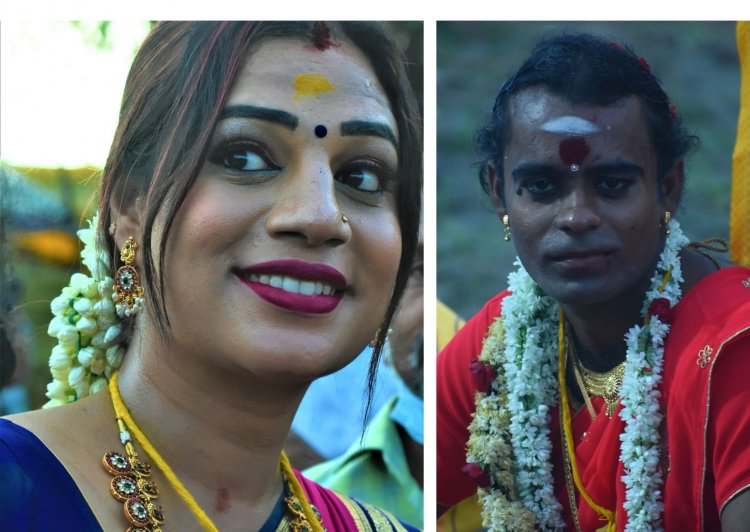
The 18-day festival is also a reference to the 18 days long Kurukshetra war. Each day marks a celebration and marks an event.
To please Goddess Kali, the Pandavas had to offer a sacrifice to gain victory. At Lord Krishna's request, Aravan voluntarily offered himself as a sacrifice and was offered three boons. The first wish was a heroic death on the battlefield. Second, to be able to see the entire battle of Kurukshetra even after his death.
And third, to be married before his death respectively. But no woman desired to marry a man for a day and who’d make them a widow the very next day for the rest of their lives.
Hence, to fulfill Aravan’s third wish, Lord Krishna transfigured himself into Celestial Mohini and married him.
The next day Aravan was sacrificed to Goddess Kali and Mohini mourned her widowhood before she transformed back to Krishna. She is a bride for a day and after Aravan’s death, becomes a widow the next day.
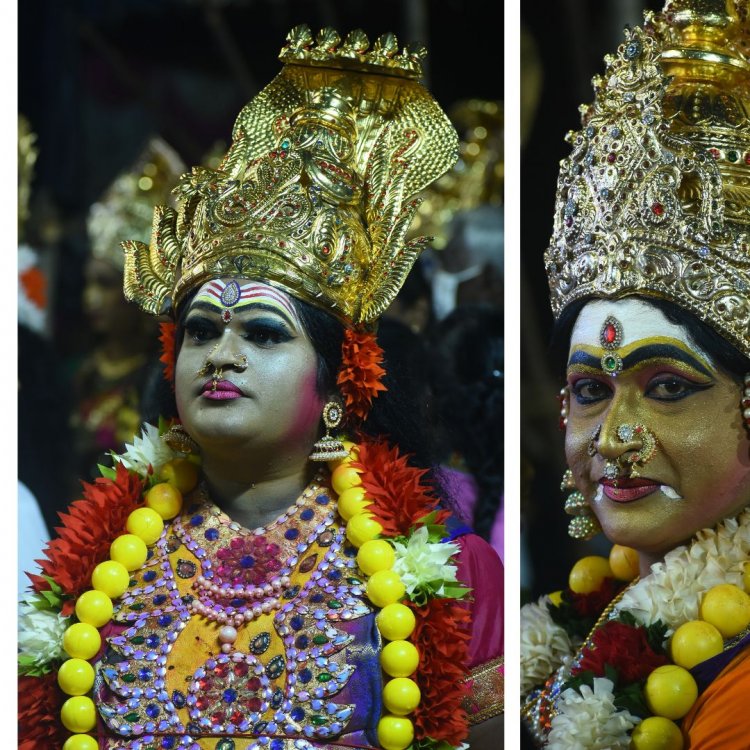
Koovagam is the biggest annual transgenders' festival held in India. The festival involves different ceremonies, various cultural events like Beauty pageants, singing, dancing, fashion shows, and awareness programs on various topics like HIV/AIDS for the first 16 days and continues for the next two days and ends on a Chaitra Pournami (full moon day).
One of the main highlights is the 'Miss Koovagam' beauty pageant event exclusively held for transgenders. The title 'Miss Koovagam' comes with due respect and pride.
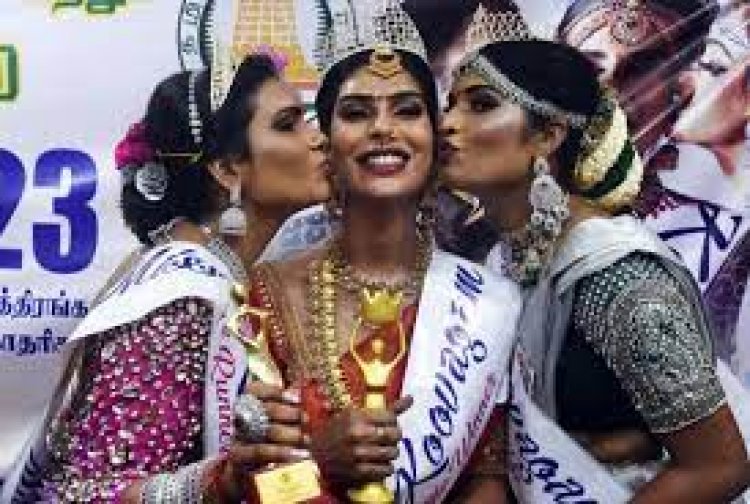
On the 17th day of the Koovagam festival, the transgenders dress up in colorful attire, sporting garlands, flowers, jewelry, headgear, and ornaments as Mohini and flock to the Koothandavar temple for a wedding ceremony with the deity Aravan.

Thousands of brides dressed in fine sarees, bangles, floral garlands, adorned in gold jewelry, and bridal makeup gather at the temple with the sacred yellow thread (mangal sutra).
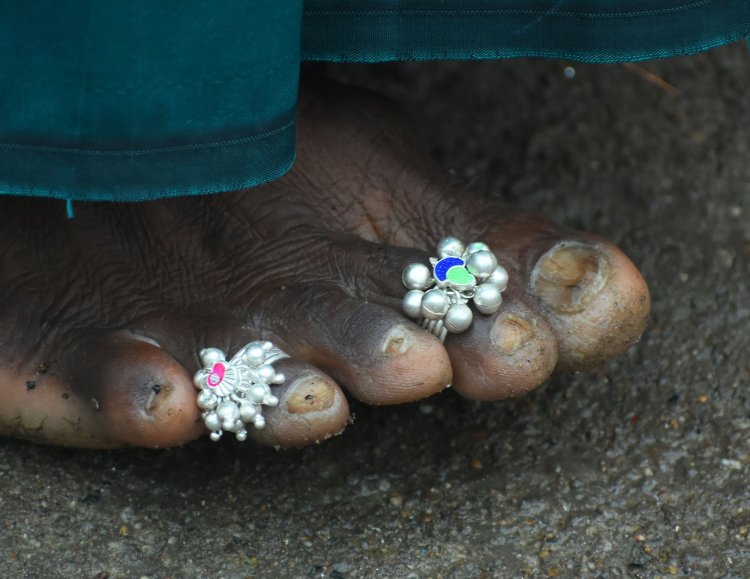
The celebration is a sight to behold when a group of priests officiates the wedding by tieing a nuptial knot in the sanctum in front of the Lord and every transgender present there is married to Aravan individually.
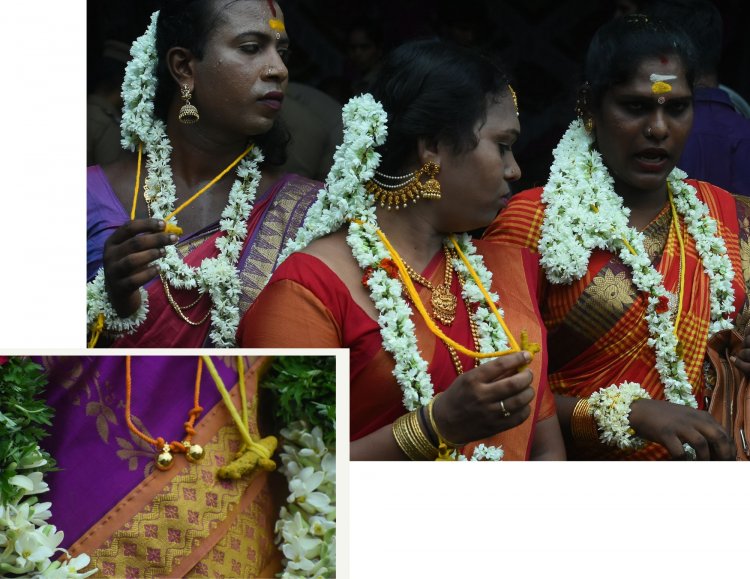
The temple priests on behalf of the deity tie the sacred thread. Later, the transgenders sing songs and perform their traditional 'kummi adi' dance by going around in a circle and greeting each other outside the temple premises.
During the festival, the head and pupils are given a fresh coat of paint in the early morning and brought out of the temple to be paraded through the village. It is kept in the temple throughout the rest of the year.
The next morning, the body parts of Aravan and their head go around the temple before it is taken out on a procession that is attended by thousands of people. Devotees gather in large numbers to pull the chariot as a part of the last day of the festival.
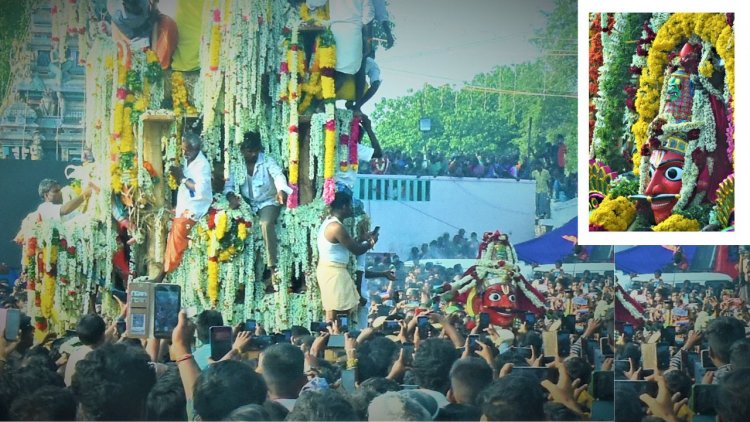
The procession goes around parts of the village and finally ends at a designated mourning ground called ‘azhukalam’at Koovaganatham village about 2 km away. The newly married transgenders are gathered here to mourn the death of Aravan and step into widowhood. The path where the chariot moves is decorated with various geometric designs by women, with flowers and Rangoli to pay respects to Lord.
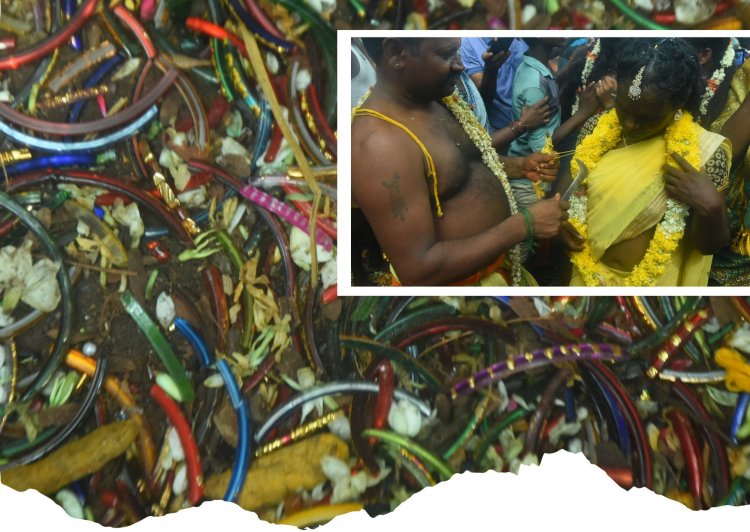
After the death, the widowed partners cry aloud, beat their chests, and mourn collectively by removing their Yellow thread-thalis (mangal sutra), and flowers and breaking their bangles.
It is a day of mourning.
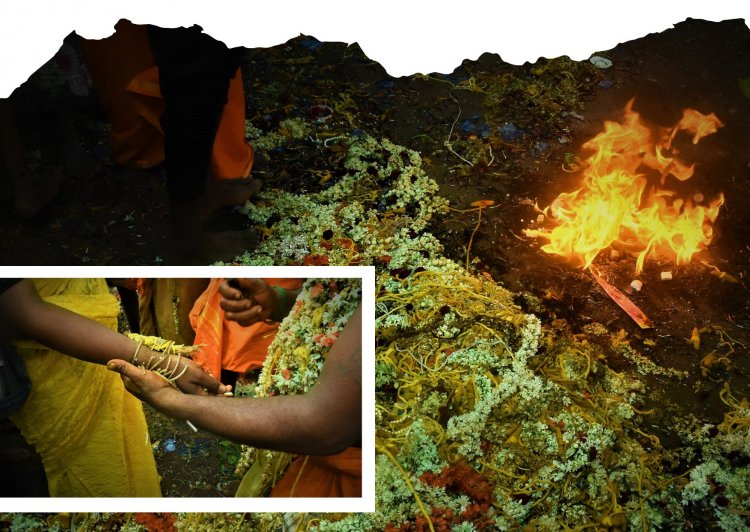
Finally, they take a bath and wear white sarees which represent their acceptance of widowhood.
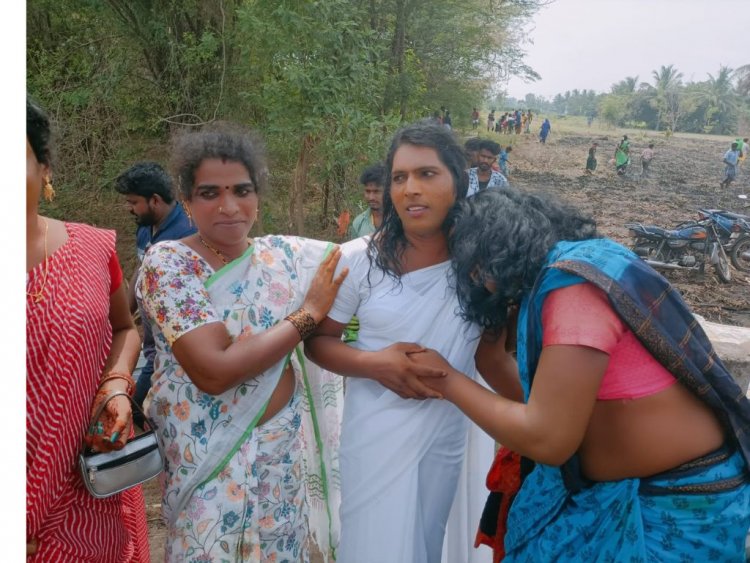
The transgender community of India has been subjected to constant harassment and discrimination. Because of differences, they have been exempted from experiencing a normal life at workplaces, in public spaces, and in society as a whole. This has resulted in them resorting to begging and sexual activities. As per the supreme court order in 2014, they have been recognized as the third gender. "It says that they have the right of every human being by birth to choose their gender," it has clearly stated that respective governments treat them equally, allot quotas in jobs and education fields along with other amenities too.
The festival of Koovagam plays an important role in the lives of the entire transgender community in India as they feel that the festival is the only place and time where they’re truly acknowledged for who they are. It’s also a place where they can meet each other and share their needs and make new associations. The festival also acts as a medium of empowerment and acceptance for the transgender community. Though the Government has recognized them as the third gender, it’s about time that we as a society stop this unfair discrimination against gender differences and begin to understand and accept that there is absolutely no difference between the communities
Gender is a powerful collective identity for the transgender community; it binds them. For cisgender people, it can be difficult to understand the gender dynamics. A festival like Koovagam is a rare occasion to meet the transgender community
Behind the beautiful faces are hidden many struggles, pain, and grief for social recognition, existence respect, and equal opportunities which are lost when we eroticize them as a group.
After all, they too are homo sapiens, treat them alike with respect!
--
